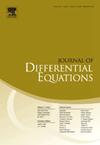Response tori in Hamiltonian systems of high order degeneracy - the super-critical case
IF 2.4
2区 数学
Q1 MATHEMATICS
引用次数: 0
Abstract
Consider the quasi-periodically forced, 2nd order differential equations where is a constant, is an integer, is a Diophantine frequency vector, ε is a small parameter, and is real analytic. It is shown in [18] that if the leading order p of non-degeneracy of satisfies , then response solutions of the equation exist under some minor conditions. Indeed, is the critical order of non-degeneracy of such that relative equilibria of the equation can be solved from its averaged equation - a typical mechanism for the existence of response solutions in perturbed, quasi-periodically forced, 2nd order nonlinear equations. In this paper, we consider the existence of response solutions of the equation for the super-critical case, i.e., is degenerate at least up to an order . We will show in this case that response solutions can still exist around perturbed relative equilibria of the normalized equation by considering non-degeneracy of the new perturbation after the normalization that is of at least order. This reveals a mechanism for the existence of response solutions of the equation in the super-critical case.
For the sake of generality, we will actually consider a general Hamiltonian normal form containing the normalized equation as a particular case. We will prove a general theorem concerning the existence of response tori of the normal form through averaging, finding relative equilibria, improving the order of perturbations, KAM iterations, and measure estimates. The general result will then be applied to the problem of the existence of response solutions of the above equation in the super-critical case. In several special situations, we will give explicitly checkable conditions for such existence in terms of Fourier coefficients of lower order terms of f.
求助全文
约1分钟内获得全文
求助全文
来源期刊
CiteScore
4.40
自引率
8.30%
发文量
543
审稿时长
9 months
期刊介绍:
The Journal of Differential Equations is concerned with the theory and the application of differential equations. The articles published are addressed not only to mathematicians but also to those engineers, physicists, and other scientists for whom differential equations are valuable research tools.
Research Areas Include:
• Mathematical control theory
• Ordinary differential equations
• Partial differential equations
• Stochastic differential equations
• Topological dynamics
• Related topics

 求助内容:
求助内容: 应助结果提醒方式:
应助结果提醒方式:


